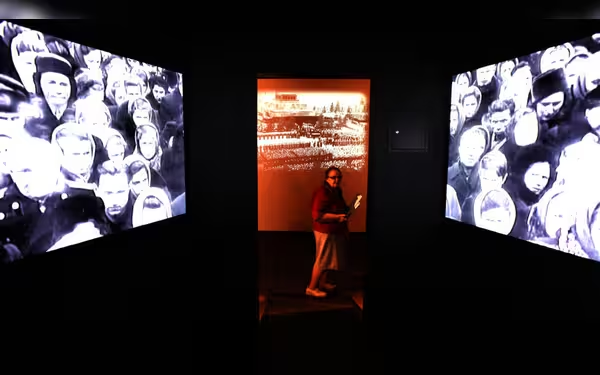Saturday, November 16, 2024 05:51 PM
Closure of Moscow Gulag History Museum Raises Concerns
- Moscow's Gulag Museum ordered to close by authorities.
- Closure sparks debate on historical narrative control.
- Museum recognized for documenting Soviet repression.
 Image Credits: thefrontierpost
Image Credits: thefrontierpostMoscow's Gulag History Museum faces closure, raising concerns over historical narrative control and repression in Russia.
Moscow's Gulag History Museum, a significant institution dedicated to the memory of those who suffered during the Soviet era, has been ordered to close by Russian authorities. This decision, effective from Thursday, has raised eyebrows and sparked discussions about the ongoing repression of independent civil society in Russia. The museum, which has received accolades for its efforts to document the dark chapters of Soviet history, is now facing a temporary shutdown under the pretext of fire safety violations.
Established in 2001, the Gulag History Museum serves as a poignant reminder of the millions who were imprisoned and often perished in the vast network of labor camps known as the gulag. These camps were notorious for their harsh conditions and were a tool of political repression during the Soviet Union. The museum combines official documents, family photographs, and personal artifacts from gulag victims, making it a vital resource for understanding this painful part of history. In the first nine months of this year alone, the museum welcomed 46,000 visitors, highlighting its importance to both locals and tourists.
The closure of the museum comes at a time when the Kremlin is intensifying its campaign against those who challenge its narrative of history. The Moscow city culture department stated, "The decision to temporarily suspend the activities of the State Gulag Museum was taken for safety reasons." However, many view this as part of a broader strategy to suppress dissent and control the historical narrative surrounding the Soviet era.
In 2021, the Council of Europe recognized the museum's efforts by awarding it the Museum Prize, commending its role in "exposing history and activating memory." This recognition underscores the museum's commitment to fostering resilience in civil society and advocating against political repression and human rights violations.
Reactions to the museum's closure have been mixed. Outside the museum, a worker named Mikhail expressed his disappointment, stating, "It’s a strong museum, very impressive. It’s disappointing that this happened. It’s a loss, a great loss if, God forbid, it’s permanent. We need people to see it, to understand, to know that it must not be repeated." In contrast, some, like a local musician named Yulia, welcomed the closure, arguing against the need for such establishments and suggesting that not every era deserves a monument.
President Vladimir Putin's administration has long sought to reshape Russia's historical narrative, often portraying figures like Joseph Stalin in a favorable light while downplaying the atrocities committed during his regime. This approach has led to a significant reduction in the acknowledgment of the millions who suffered during the Great Terror, as the government promotes a narrative of Soviet strength and resilience.
The recent closure of the Gulag History Museum is not an isolated incident. It reflects a troubling trend in Russia, where authorities have increasingly targeted organizations and individuals who challenge the official narrative. The liquidation of Memorial, a Nobel Prize-winning NGO that documented victims of Soviet repression, is a stark example of this crackdown.
As the world watches these developments unfold, it is crucial to remember the importance of historical memory. Museums like the Gulag History Museum play a vital role in ensuring that the stories of those who suffered are not forgotten. They serve as a reminder of the past, urging society to learn from history to prevent the repetition of such dark times. The closure of this museum raises significant questions about freedom of expression and the preservation of historical truth in contemporary Russia.













